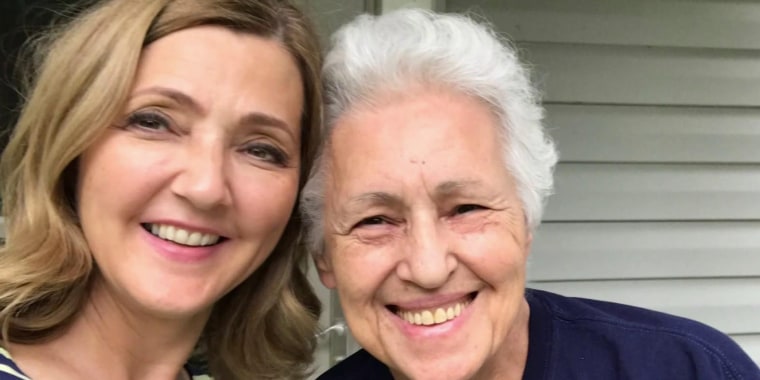NBC News correspondent Chris Jansing is pleading for others to take the coronavirus pandemic seriously after three family members were hospitalized with the disease.
During an appearance on NBC News Now, Jansing said that even as her family has coped with multiple severe instances of the virus, she is "painfully aware of the fact that" thousands of other families "are going through the same thing" on any given day.
"My first experience was back in late July when my Aunt Margie in Florida died of COVID in a hospital there, and I said goodbye on FaceTime," Jansing said. "Last month, my brother Jim, who is special needs, was hospitalized for six days. Fortunately, he recovered, but he does not like to be alone, and isolation for these patients remains one of the horrors, absolute horrors, of this disease."
Jansing, who is the youngest of 12 children, said that immediately following Christmas, her sister Janice was rushed to the hospital, where she coded and was put on a ventilator for several days.
"Four times they tried to wean her off the ventilator," Jansing recalled. "Finally, when they were able to get her to breathe on her own, the first thing the doctor told us she said was 'I've been to hell and back.'"
Now, her sister is in a nursing home for physical therapy, where Jansing said she is still "too weak to sit up" or "stand on her own" after more than two weeks.
Jansing said that she hopes her family's story, which has been "repeated literally millions of times" around the country, shows the danger of the pandemic to those who have not complied with mask-wearing or requests to socially distance.
"It is mind-boggling to me that there are still people out there who deny that this is happening, who refuse to wear a mask, who refuse to socially distance," Jansing said. "My message is pretty simple: Wear a mask, socially distance. This can happen to you, and trust me, you don't want it to."
Jansing also shared some advice for families who find themselves in a similar position.
"I went to Vin Gupta (NBC News medical contributor) ... and I said 'What would you say to families who are going through this, what can you do?'" Jansing explained. "He said, 'First of all, don't feel guilty about wanting information.'"
This means that families should feel comfortable with asking doctors questions, and sharing information about their loved ones.
"I think our family felt like 'Should we be bothering the doctors and nurses, they're so busy?'" Jansing said. "And (Gupta) said 'You need to take a role in their care, it's helpful to the doctors, and that's their job.'"
Another thing that's important is making sure that you're aware of the goals of care. For Jansing, that means making sure that her sister, who is still weak, is getting enough calories.
"You don't know everything, and it's good to reach out and try to get information about what your particular family member may need," Jansing said.
The most important part of Jansing's advice was also the "really hard part" of the pandemic: Make sure that you know what your family members would want if they are not in a place to make decisions themselves.
"Have you had conversations with members of your family, even apart from coronavirus, about what their desires would be?" Jansing asked. "My sister's a fighter; they did not ask us about putting her on a ventilator, it's something they did after she coded, but it's also something that she would have wanted. Do you know what your family members want?"
Jansing warned that people shouldn't feel a false sense of security if their loved ones are not high-risk: The coronavirus can effect even young people severely, and COVID-19 isn't the only thing that can send someone to the hospital.
"(Your family members) don't have to be 82 years old. The fact of the matter is, all of us could find ourselves in the situation of a hospitalization, and so these are the conversations that I think this particularly horrible experience for all of us in America have brought to the fore," Jansing explained. "Know what members of your family want, should they, and we hope they're not, but should they be in this awful situation."


